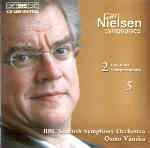Osmo Vänskä’s Nielsen cycle has been a mixed bag, compounded equally of inspiration and exaggeration, laxity and fussiness, all projected by a provincial ensemble that while good, certainly isn’t first class or even as fine as Vänskä’s Lahti forces. This final installment runs true to form: a smashing account of the Fifth comes harnessed to a mediocre Second, though for many the excellence of the former will more than compensate for any shortcomings in the performance of the latter. Here’s the scoop:
Vänskä’s Four Temperaments is both very fast and very slow, and for that reason very annoying. The opening doesn’t sound so much choleric as confused: at this tempo the strings audibly approximate their passage-work, and at climaxes the trombones bellow vulgarly and ensemble balance goes to hell. The second movement also steps too quickly; its “commodo” (“comfortable”) directive is ignored in favor of an over-emphatic nervous edge when compared to other more sympathetic interpretations. On the other hand, the slow movement crawls by at a shocking 13 minutes. “Andante” it is not, and its length throws off the proportions of the whole symphony. In particular, it trivializes the finale that otherwise proceeds at a normal tempo.
In contrast, the Fifth is mostly excellent, with correct tempos, better playing, and much care lavished on getting the details right. Fans of the work will need to know little more than the fact that the first-movement snare-drum cadenza, rim-shots and all, is the best since Horenstein’s–but fortunately the playing overall is much more secure and Vänskä’s second movement is as dynamic and exciting as his first (unlike Horenstein who typically goes into a musical coma in the symphony’s second half). On the debit side, and despite superb playing from the principal clarinet, the wind section of this orchestra is adequate but otherwise nothing to cheer about. Certainly these players–flutes especially–don’t compare to the excellence of the Danish competition under Michael Schonwandt on Dacapo: they tend to get lost in tutti passages, whereas the Danes cut right through the busiest string accompaniments. In addition, the percussive “hostile forces” could have a bit more bite when they first erupt.
Vänskä has decided to use the new critical edition that returns (wrongly in my view) to Nielsen’s first thoughts, including less effective horn parts at the first-movement adagio’s initial, pre-snare drum climax, and omitting those powerful timpani riffs in the finale’s mad triplet episode just before the first fugue. Be that as it may, Vänskä builds that initial fugue to a wonderfully hysterical climax, and the rush to the finish, with excellent brass playing in those leaping octave figures, wraps up the work in a blaze of trumpet and horn-led glory.
Sonically, aside from the weakness in the winds and a certain lightness in the bass endemic to English orchestras (timpani and lower strings in particular could have more impact), BIS captures the performances faithfully. If you love the Fifth, you’ll really have to hear this; but overall it’s difficult to maintain that Vänskä has this music in his blood the way he does that of Sibelius. The best cycle overall remains Schonwandt’s on Dacapo, not because it’s Danish, but because it offers the most idiomatic and sympathetic combination of excellent playing, conducting, and sound.
































